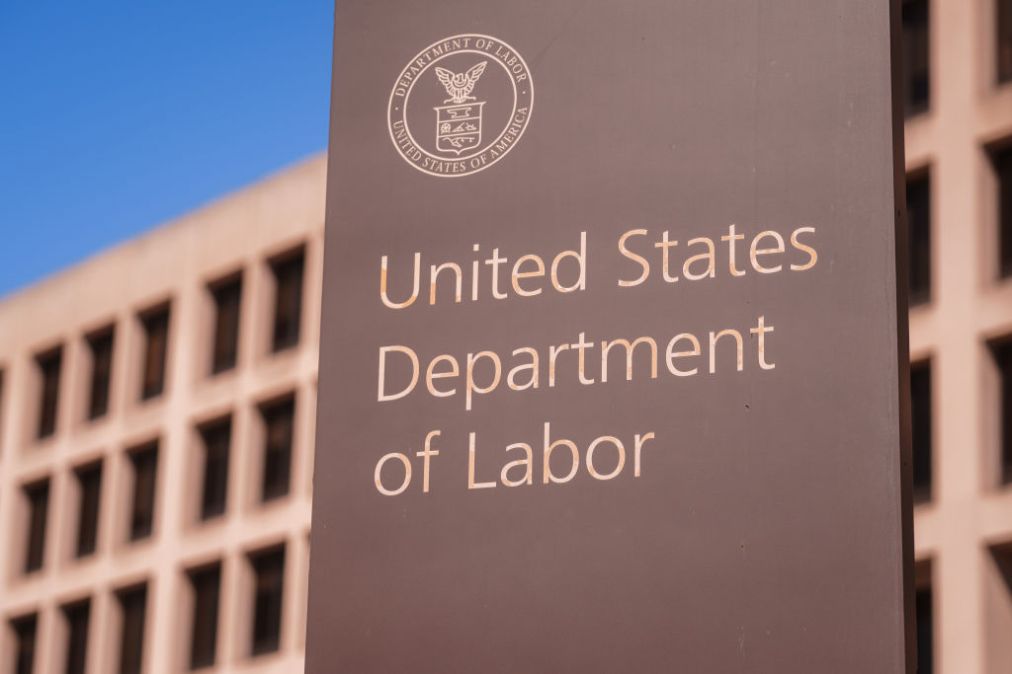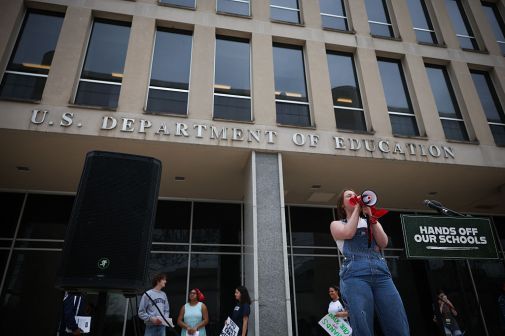Statistics, public data leaders condemn Trump’s order to fire BLS commissioner

Organizations and leaders representing the interests of statistical professionals and public data access strongly criticized President Donald Trump’s order to fire the leader of the Bureau of Labor Statistics after lower than expected jobs numbers Friday, saying his comments undermine public trust in that information.
Their responses came after Trump posted on his social media site Friday afternoon with allegations that Commissioner Erika McEntarfer “faked” BLS statistics in an effort to help Kamala Harris in the 2024 presidential election, pointing to instances of revisions — which are a standard part of the agency’s process.
Trump’s comments and order to fire McEntarfer appeared to primarily be in response to a BLS jobs report that showed lower figures than anticipated, which sent shockwaves through the statistical community. Multiple leaders, including his own former BLS commissioner, spoke out against the action in no uncertain terms, saying the president’s comments politicize the data.
“This rationale for firing Dr. McEntarfer is without merit and undermines the credibility of federal economic statistics that are a cornerstone of intelligent economic decision-making by businesses, families, and policymakers,” Friends of the Bureau of Labor Statistics said in a statement Friday night.
That group is chaired by two former BLS commissioners — Bill Beach and Erica Groshen, who were appointed by Trump and Barack Obama, respectively — as well as Paul Schroeder, the executive director of the Council of Professional Associations on Federal Statistics. Its steering committee also includes leaders from the Urban Institute and the American Statistical Association, among others.
“U.S. official statistics are the gold standard globally. When leaders of other nations have politicized economic data, it has destroyed public trust in all official statistics and in government science,” the Friends of the BLS statement said.
The organization called for Congress to make an immediate response and investigate the circumstances of McEntarfer’s removal. They also urged her continued service.
McEntarfer, an appointee of President Joe Biden, began her four-year term as BLS commissioner January 2024 following a bipartisan 86-8 confirmation vote by the Senate. Prior to that role, she had served as an economist for the White House Council of Economic Advisers and the Census Bureau’s Center for Economic Studies. She has a doctorate in economics from Virginia Tech.
BLS, which is part of the Department of Labor, didn’t respond to FedScoop’s request for comment on whether McEntarfer was officially out of her position, but a White House statement that doubled down on the president’s comments Friday night called her the “former” commissioner.
That statement, again, claimed that BLS “consistently published overly optimistic jobs numbers — only for those numbers to be quietly revised later.”
Part of the process
Statistical leaders and those familiar with BLS’s operations, however, said its process to produce and revise data is the same as it’s always been, and they fear norms to protect civil servants who produce that information are falling away.
“We are concerned because it’s a sign that politics beat facts — that anyone would question the process that BLS uses to regularly produce the data. Nothing has changed. This happens in all administrations,” Amy O’Hara, the president of the Association of Public Data Users, said in an interview with FedScoop.
APDU is a nonprofit network of people using, producing and disseminating government statistical data.
“It’s just completely disheartening. It’s a sign that norms that have long existed are shattered,” O’Hara said, pointing to other countries like Greece and Argentina, who have prosecuted statisticians. “We hope that we’re not on that path,” she said.
Dan Koh, a former chief of staff at DOL during the Biden administration, told FedScoop that the creation of the jobs report is a scientific process akin to polling that involves sampling a pool of thousands of people to determine the number. That data is captured monthly and annually, and as data comes in over time, numbers are updated.
“Let me be very clear: No party, no administration, regardless of party likes downward revisions, right? We didn’t like it. I’m sure Trump doesn’t like it, but it’s just the nature of the game. If you want accuracy, then you need to do this process,” Koh said.
He added: “The notion that revisions are some kind of conspiracy is crazy.”
Koh also criticized Trump’s implication that McEntarfer was a Biden holdover. He noted that he was at DOL when Beach, Trump’s appointed commissioner from his first term, was still leading the labor statistics agency, and found him “incredibly competent.” Koh said: “I respected him deeply.”
“If Trump installs a loyalist, that person could, in theory, decide to fudge the numbers to please Donald Trump if he or she is feeling the heat,” Koh said. “It’s actually not at all dissimilar from installing a loyalist at the Fed for interest rates, right? It’s just less lesser known.”
In his post to Truth Social, Trump also took a jab at Federal Reserve Chair Jerome Powell, saying he “should also be ‘out to pasture.’”
Widespread impact
Data that BLS produces, including the jobs report, serve as important datapoints for researchers, businesses, and governments around the world, Lynda Kellam, one of the founding members of the Data Rescue Project, said in an interview with FedScoop.
“The loss of trust in and also access to any kind of economic data, especially data coming out of the BLS, will have a widespread impact on people in this nation and people abroad,” Kellam said.
Kellam said the Data Rescue Project, which began earlier this year to function as a clearinghouse for rescuing at-risk U.S. government data, had already heard from entities outside the country who were concerned about access to economic data prior to Trump’s firing of McEntarfer.
During the Trump administration, certain datasets across the federal government have been removed or terminated, including data related to climate; diversity, equity and inclusion (DEI); and data from the now-defunct U.S. Agency for International Development.
But Kellam said that generally, there haven’t been as many takedowns of information as anticipated, and what the organization is seeing is an “erosion and expertise behind the scenes.”
“It’s a more complex picture than just data coming down or being altered,” she said. “It’s also the infrastructure [that] is being damaged by the loss of expertise.”
BLS has not been spared from proposed cuts and, in fact, the administration’s budget proposal for fiscal year 2026 requested an over 8% decrease for the labor statistics agency. At the same time, the BLS also recently announced it would be reducing its sample collection due to resource constraints.
In addition to criticizing McEntarfer’s firing, the data community also responded by emphasizing support for the statistical current system and the civil servants that work within it.
“Statistical independence is not dependent on any single individual but is built into the system itself through robust policies, procedures, legal frameworks, and the culture and people of the statistical system,” Nick Hart, president of the nonpartisan, nonprofit Data Foundation, said in a written statement.
Hart continued that the Office of Management and Budget’s recent Public Trust Rule, which stemmed from a statute signed into law by Trump during his first term, codified four principles for statistical agencies like BLS: That information is timely, credible and accurate, objective and protects the confidentiality of providers.
“We have confidence that federal statistical products retain their fidelity to those principles,” Hart said.




